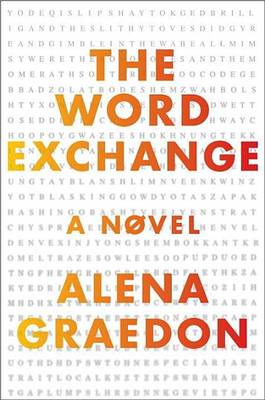Reviewed by Briana @ Pages Unbound on
The Word Exchange offers a captivating premise, and bibliophiles will swarm to read this book about words, their meaning, and their potential loss in the digital age. Graedon draws on all our modern dreams of being able to sync seamlessly with information—and all our fears about the loss of “real” reading and writing when everything is being made bite-sized to fit on a screen. The result is a novel that is one crazy ride of viruses and epidemics and conspiracies and romance. Its execution could be better, and a little less self-aware, but most readers will be too drawn in by the concept to be deterred by the writing and structure.
The novel is written from two characters’ points-of-views: Ana’s, whose narration is quiet and reflective, and Bart’s, whose narration is smart but occasionally endearingly gruff. At the start Graedon seems to be warming up her writing chops because the novel reads like the work of someone who is trying very hard to be clever and include “cool” things to appeal to logophiles. There are “witty” definitions at the beginning of each chapter, and the characters employ a plethora of “advanced vocabulary.” Yes, this can be (and is, at the very end of the book) explained by the fact that both work for a Dictionary, but the use of the words sounds forced, as if Graedon plunked them there intentionally; it does sound as if Graedon, or Ana, are people who use such words naturally. Ana also includes footnotes, with the somewhat unsatisfactory explanation that using footnotes helps one recuperate from the word flu faster. Again, they generally feel forced, not like information that necessitates footnotes.
The Word Exchange also features a few sections with discursive ponderings on the meaning of words and language and love and philosophy. Sometimes these are parts from Bart’s journal; sometimes they are letters. Often, they reminded me of the excerpts of Goldstein’s book in 1984—a means for the author to drop huge amounts of information about the plot and philosophy of the novel on the reader. The information is important, but it can be conveyed in more compelling manners, integrated more seamlessly into the narrative.
Overall, however, the plot of The Word Exchange is exciting. In the first place, the characters are interesting studies on their own. My personal favorite is Bart, and I was hooked from the start by the hints of a possible romance between him and Ana. Their relationship is not at all stereotypically swoony, but it is very moving and meaningful. Of course, the real focus is on the “word flu” and the very real threat that all language will be lost. This is dystopian enough on its own, but Graedon throws in some conspiracies and people trying to hunt Ana and Bart down, just for good measure.
I am still unclear on some of the logistics of the disease and the motives of those who disseminated it, even though they were extensively explained, multiple times. The whole idea does require some suspension of disbelief, however. One needs to accept that technology will be able to alter one’s cells and DNA and get into one’s brain and replace words with nonsense words and that the users of this technology will not even notice (and that this is somehow financially lucrative for certain people). One must also accept that such a disease is transmittable just by speaking to someone who has it, which seems the least likely aspect of all. (Ironically, speaking to someone without the disease is also recommended therapy for someone with the disease.)
The Word Exchange explores a fascinating concept, and one that will resonate with many readers today. The execution of the idea could be a bit smoother (or perhaps less pretentious in some places), but the story is both fun and evocative nonetheless. A smart choice for readers who enjoy dystopians set in the near-future and those who enjoy words and language for their own sake.
Reading updates
- Started reading
- 22 March, 2014: Finished reading
- 22 March, 2014: Reviewed
